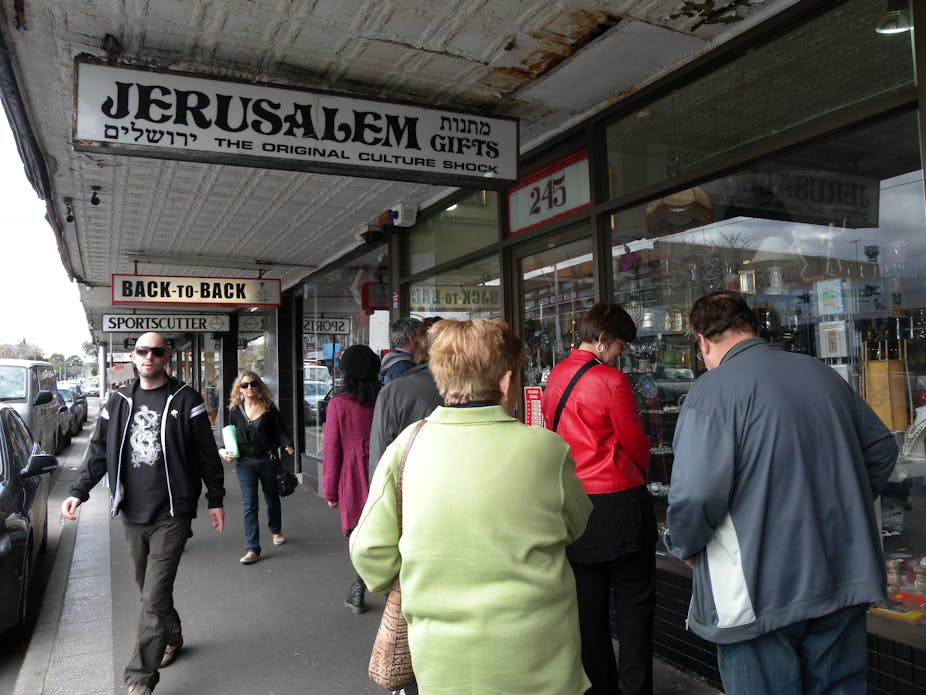Young adult fiction and complex themes go hand in hand – not least in one of the most recent entries to this field.
Melbourne-based writer Eli Glasman’s debut novel The Boy’s Own Manual to Being a Proper Jew opens a window on growing up Jewish and the ramifications this has for the development of an individual’s sexuality; protagonist, 17-year-old Yossi Speilman, is working out how to be gay in a strictly orthodox family.
Glasman’s book is a breath of fresh air, and fascinating culturally. Having lived in Melbourne’s Caulfield and St Kilda I’m familiar with the sight of Jewish families in the streets on Saturday and the men and boys in long coats with their sideburns and hats.
I’m guilty of reading this visual display of religiosity as a one-dimensional indicator of a life committed to religion with no room for fun or personal choice. Glasman’s novel has opened my eyes and reminded me (yet again) of the danger of cultural stereotypes.
Being serious about one’s religion does not, of course, mean being devoid of a sense of humour or of not having fun with your mates. Religion may provide some certainty and rules for living but it does not preclude the need for individual self-discovery that all adolescents experience.
Yossi is a young man committed to his religion, culture and community but also a typical teenager exploring his sexual feelings. I found him a delightful character and was relieved Glasman didn’t portray Yossi’s homosexuality as a torturous burden that blights his life.
Earlier young adult novels about gay and lesbian characters such as John Donovan’s I’ll Get There. It Better be Worth the Trip (1969) or more recently Julie Ann Peters’ Keeping You a Secret (2003) frequently did take this path – the sexuality of the character being the defining quality of their lives and a problem that had to be solved.

Refreshingly, Yossi does not find his homosexuality an insurmountable – the challenge is how to express it within the laws of Judaism and how to tell his friends, family and wider community. Yossi knows he is gay, he has always known; he isn’t embarrassed and he knows he can’t change.
Yossi does initially seek help from Rabbi Pilcer via an internet chat site, who advises him to wear a rubber band on his wrist and snap it whenever Yossi has a sexual thought about another male. This, Pilcer claims, will “cure” him. It doesn’t.
The Jewish teachings on sexual behaviour are complicated and, to an outsider, peculiar. It is OK to have a wet dream but masturbating is forbidden; having homosexual thoughts is all right but acting on them isn’t. Yossi’s friendship with a new kid at school, Josh, is pivotal in his coming-out process.
Josh does not have an orthodox Jewish background and challenges many of Yossi’s religious beliefs. Glasman uses these conversations between Yossi and Josh to explain various Jewish teachings, not just those on sexuality.
Josh takes Yossi to his first gay synagogue and through this Yossi begins to understand that he can be gay and religious – he meets other gay Jews and begins to see a way forward for himself.
Yossi has his first sexual experience with Josh and, for once in a young adult novel, the sex did not make me cringe. It is natural, simple, affectionate and just slightly uncomfortable. It isn’t overly graphic, nor is it coy.
The morning after, Yossi isn’t embarrassed or filled with remorse but quietly and with humour discusses the reasons for the religious prohibitions against anal sex and condoms with Josh.

As Yossi says, preempting the reader’s possible response, some of this may seem silly but it is still interesting.
Coming out isn’t easy for Yossi; his father, sister and friends don’t accept immediately that he is gay; they learn as Yossi does to integrate their idea of homosexuality into their orthodox worldview. Glasman does a great job of presenting a balanced account of Yossi’s experience.
For every challenge he faces coming out to his Jewish community he also finds support and kindness from strangers, friends and family.
Glasman has avoided the trap of producing a novel about teenage sexuality; he has written a story about an interesting, intelligent and loving young man who happens to be Jewish and gay. Yossi never feels like an afterthought, created to populate an issue based or “problem” novel.
Australian writing for young adults has moved on as has our thinking about what it means to be gay.
Yossi’s life is not defined by his gayness or his Jewishness and neither is Glasman’s novel. Sure this novel could be a real comfort and support to young people facing coming out in a potentially hostile environment but it is also a joyful book that would inspire all readers to question the rules and to use creativity and love to find their path in life.
The Boy’s Own Manual to Being a Proper Jew by Eli Glasman is published by Sleepers, and will be launched at Readings, St Kilda, Melbourne, on July 24.

